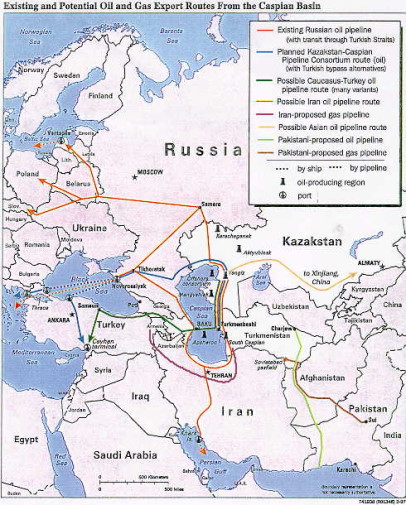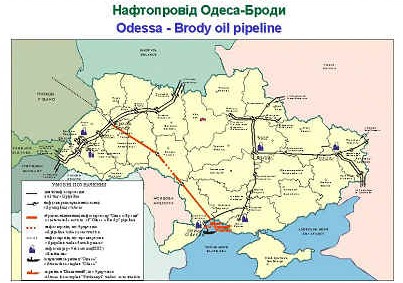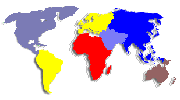|
Washington Interest in Ukraine:
US Intervention for 'Democracy'?
By William Engdahl
The current battle over the election for President to succeed the pro-Moscow Leonid Kuchma in Ukraine is more complex than the general Western media accounts suggest.
Both Putin and Bush are engaged in highest stakes geopolitical power plays. Both sides in Ukraine have evidently engaged in widespread vote fraud. Western media chooses to
report only one side, however. Case in point: the British human rights group, Helsinki Watch Group, reports it found more vote irregularities on the side of the opposition
Yushchenko than from the pro-Moscow Yanukovych. The Kuchma regime is anti-democratic and no model for human rights, one factor which feeds an opposition movement. Yet
the issue is Eurasian geopolitical control far more than is realized.
The Ukraine election is not about Western US-sanctioned democratic voting, as some magic formula to open the door
to free market reform. It is about who controls the largest neighbor of Russia, Washington or Moscow. A dangerous power play by Washington is involved.
A look at the geo-strategic setting, makes things clearer. Ukraine is historically tied to Russia, geographically and
culturally. It is Slavic, and home of the first Russian state, Kiev Rus. Its 52 million people are the second largest in eastern Europe, and it is regarded as the strategic buffer
between Russia and a string of new US NATO bases from Poland to Bulgaria to Kosovo, all of which have carefully grown up since the collapse of the Soviet Union. Most
important, Ukraine is the transit land for most major Russian Siberian gas pipelines to Germany and the rest of Europe.
Yushchenko favors EU membership and NATO membership for Ukraine. Not surprising, he is backed strongly by Washington.
Zbigniew Brzezinski has been directly involved on behalf of the Administration in grooming Yushchenko for his role.
As far back as November 2001 Yushchenko was wined and dined in Washington by the Bush Administration, paid for by
the semi-private Congress-funded National Endowment for Democracy (NED). Martin Foulner in the Glasgow Herald of November 26 reported the details of the meeting. The NED
was set up during the Reagan Administration by Congress, to ‘privatize’ certain CIA operations, and allow Washington to claim clean hands in certain foreign operations. Ukraine is part
of a wider US pattern of active ‘regime change’ in eastern Europe and Central Asia.
The NED is US Government funded. Brzezinski was also directly involved in Ukraine, and has openly condemned the
election results along with Henry Kissinger. Brzezinski’s entire career has been to dismantle Russian power in Eurasia since the time he was Jimmy Carter’s National Security Council
head. If Brzezinski succeeds in getting his hand-picked man in Kiev, that will be a major step in the direction of US domination of all Eurasia. That, of course, is the aim, as
Brzezinski makes explicit in his writings.
It is useful to quote Brezezinski directly from his now famous 1997 book, The Grand Chessboard: American Primacy and its
Geostrategic Imperatives.
"Geopolitical pivots are the states whose importance is
derived not from their power and motivation but rather from their sensitive location and from the consequences of their potentially vulnerable condition for the behavior of
geostrategic players… Ukraine, Azerbaijan, South Korea, Turkey and Iran play the role of critically important geopolitical pivots…
"Ukraine, a new and important space on the Eurasian
chessboard is a geopolitical pivot because its very existence as an independent country helps to transform Russia. Without Ukraine, Russia ceases to be a Eurasian empire.
Russia without Ukraine can still strive for imperial status, but it would then become a predominantly Asian imperial state, more likely to be drawn into debilitating conflicts with
aroused Central Asians, who would then be supported by their fellow Islamic states to the south.
"However, if Moscow regains control over Ukraine, with its
52 million people and major resources as well as access to the Black Sea, Russia automatically again regains the wherewithal to become a powerful imperial state, spanning Europe and Asia.
"Ukraine’s determination to preserve its independence was encouraged by external support. In July 1996, the US secretary of defense declared, 'I cannot overestimate the
importance of Ukraine as an independent country to the security and stability of all of Europe,' while in September, the German chancellor…went further in declaring that
'Ukraine’s firm place in Europe can no longer be challenged by anyone…'
"The states deserving America’s strongest geopolitical support are Azerbaijan, Uzbekistan, and Ukraine, all three
being geopolitcally pivotal. Indeed, Kiev’s role reinforces the argument that Ukraine is the critical state, insofar as Russia’s own future evolution is concerned."
Putin and Moscow fully realize the stakes, which explains Putin’s open backing of the Yanukovych win at the start of this drama.
There is a distinct pattern of US covert aid in changing regimes in Eastern Europe, in which Ukraine fits the pattern.
The Belgrade vote in 2000 to beat Milosevic was organized and run by US Amabassador Richard Miles. This is well documented by Balkan sources. Significantly, the same Miles
was then sent to Georgia where he engineered the toppling of Shevardnadze in favor of the US-groomed Mikhail Saakashvili last year, another pro-NATO man on Moscow’s fringe. James
Baker III played a key role as well as many noted at the time.
Now Miles is covertly involved in Kiev with the US Ambassador there, John Herbst, former Ambassador in Uzbekistan. Curious coincidence? The Ukraine ‘democratic
youth’ organization, Pora (‘high time’) is a slick, USA-created entity. It is modeled on the Belgrade youth group, Otpor, which Miles also set up with help of the NED and Soros’ Open
Society, US AID and friends. Pora was given a brand image for selling to the Western media, a slick logo of a black-white clenched fist. It even has a nifty name, the ‘chestnut
revolution’ as in ‘chestnuts roasting on an open fire…’
Before he came into power, Saakashvili was brought by Miles to Belgrade to study the model there. In the Ukraine,
according to British media and other accounts, George Soros’ Open Society, the US government’s ‘private’ National Endowment for Democracy (NED), which played the key role
in toppling Milosevic in 2000, and the Carnegie Endowment, along with State Department USAID, all are involved in fostering Ukraine regime change. Little wonder Moscow is a
bit concerned with Washington actions in Ukraine.
A key part of the media game has been the claim that Yushchenko won ‘exit polls.’ What is not said is that the
people doing these ‘exit polls’ as voters left voting places, were US-trained and paid by Freedom House, a neo-conservative operation in Washington. They trained 1,000
poll observers who declared an 11 point lead for Yushchenko which triggered the mass marches claiming fraud. The current head of the Freedom House is former CIA chief and outspoken
neo-conservative, R. James Woolsey. On the Freedom House board sits none other than Zbigniew Brzezinski. This is hardly an impartial human rights organization.
Why does Washington care so much about vote integrity next door to Russia? Is Ukraine democracy more important
than Azeri or Iraqi ‘democracy’? There is something else going on than what appears to be a vote contest. We have to ask why it is that the Bush Administration suddenly is so keen on
the sanctity of the democratic vote process as to risk an open break with Moscow at this time.
Eurasian oil geopolitics
US policy, as Brzezinski openly stated in The Grand Chessboard, is to Balkanize Eurasia and ensure that no
possible link between Russia and the EU and China emerges in the future that might challenge US global hegemony. This is the idea of the Bush Doctrine of ‘pre-emptive wars.’ In taking
control of Ukraine, Washington would take a giant step to encircle Russia for the future. Russian moves to use its vast energy reserves to play for room in rebuilding its political role
would be over. Chinese efforts to link with Russia to secure some independence from US energy control would also be over. Iran’s attempts to secure support from Russia against the Washington pressure would end.
Washington policy is also to control directly the oil and gas flows from the Caspian including Turkmenistan, and to
counter Russian regional influence from Georgia to Ukraine to Azerbaijan and Iran.
Oil pipeline politics are also directly involved in the fight for control of Ukraine. In July 2004 the Ukraine Parliament voted
to open an unused oil pipeline to transport oil from Russian Urals fields to the port of Odessa. The Bush Administration vehemently protested this would make Ukraine more dependent on Moscow.

The 674 kilometer oil pipeline, completed by the Ukraine government in 2001 between Odessa on the Black Sea and
Brody in Western Ukraine can carry up to 240,000 barrels a day of oil. In April 2004, the Ukraine government agreed to extend Brody to the Polish Port of Gdansk, a move hailed in
Washington and Brussels. It would carry Caspian oil to the EU independent of Russia. That is were Ukraine to become dominated by a pro-EU pro-NATO regime in the November vote.
The stakes were big. George Bush Sr. made a quiet trip to Kiev in May to meet both candidates according to the British
New Statesman of December 6. Former US Secretary of State Madelaine Albright flew in to Kiev as well.
Then in July, the Kuchma government suddenly reversed itself and voted to reverse the oil flows in Brody-Odessa to allow it to transport Russian crude to the Black Sea.
Commenting on the significance of that move, Ilan Berman of the American Foreign Policy Council in Washington remarked
at the time, “Kremlin officials understand full well that Odessa-Brody has the potential to deal a fatal blow to Russia’s current near monopoly on Caspian energy.” Berman then adds
a telling note, “Worse still, from Russia’s perspective, the resulting European and US economic attention would all but cement Kiev’s Westward trajectory.” The pipeline to Poland, a
3-year project, would make Poland a major new hub for non-Russian, non-OPEC oil as well Berman notes.

The decision to reverse the pipeline last July would greatly weaken that Westward shift of Ukraine. Ukraine is a strategic
battleground in this geopolitical tug-of-war between Washington and Moscow. Ukrainian pipeline routes account for 75% of EU oil imports from Russia and Central Asia, and 34
% of its natural gas import. In the near future, EU energy imports via Ukraine are set to expand significantly with the opening of huge oil and gas fields in Azerbaijan, Kazakhstan,
Turkmenistan and Uzbekistan. Ukraine is a key piece on Brzezinski’s Eurasian chessboard to say the least.
David Frum, friend of Richard Perle, and author of the famous Bush ‘Axis of Evil’ State of the Union speech, recently wrote,
‘Russia plus Ukraine is the Russian Empire which can never be a democracy.’ Yet the same neo-conservatives are on record openly backing a ‘preemptive expansion of what they openly
term an ‘American Empire.’ It suggests geopolitics, and not democracy, is the real issue for Washington.
Druckversion 
Leserbrief 

|



